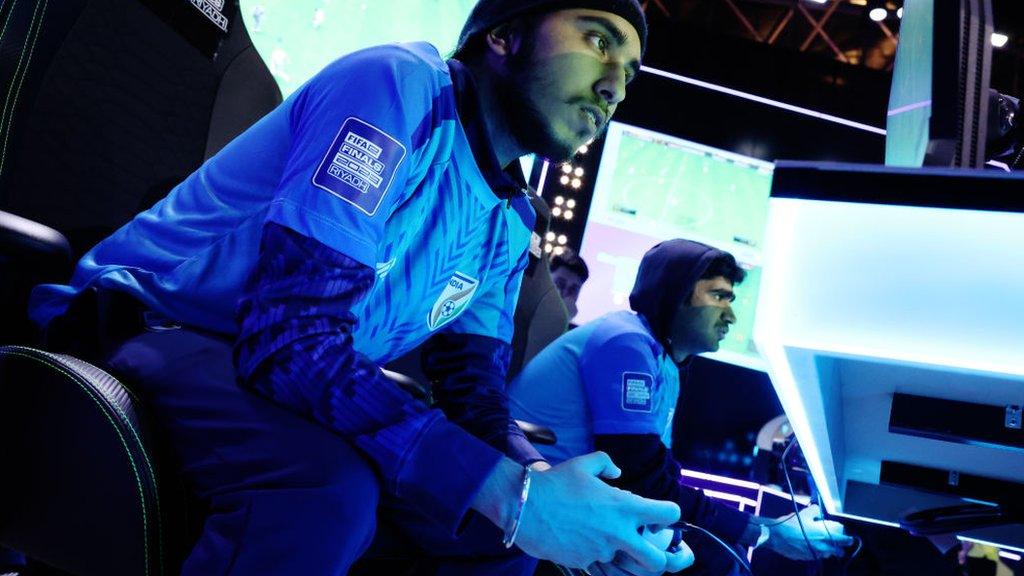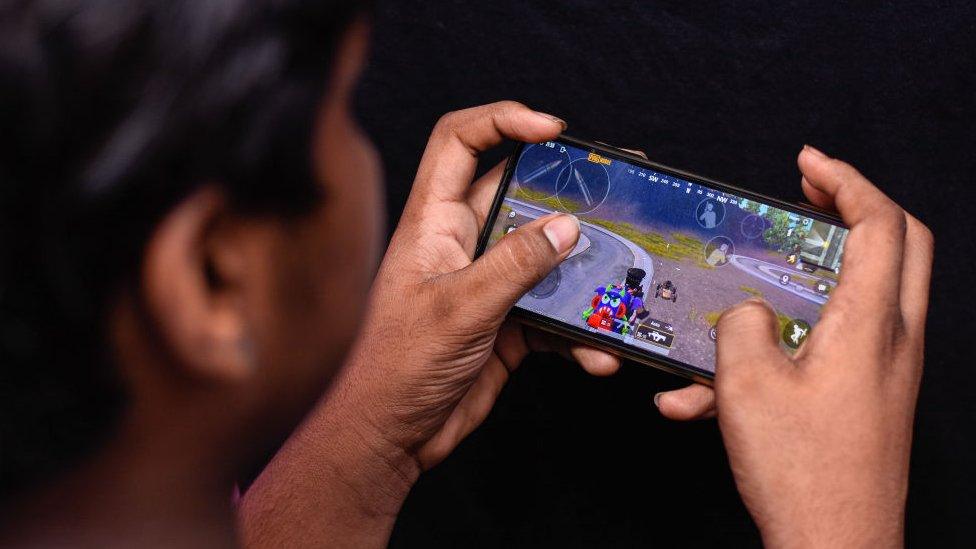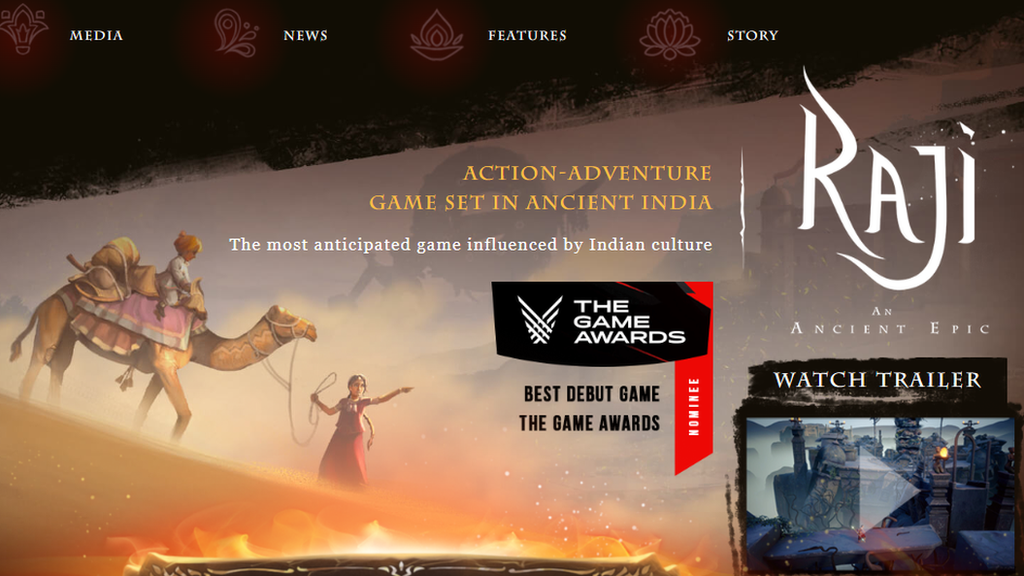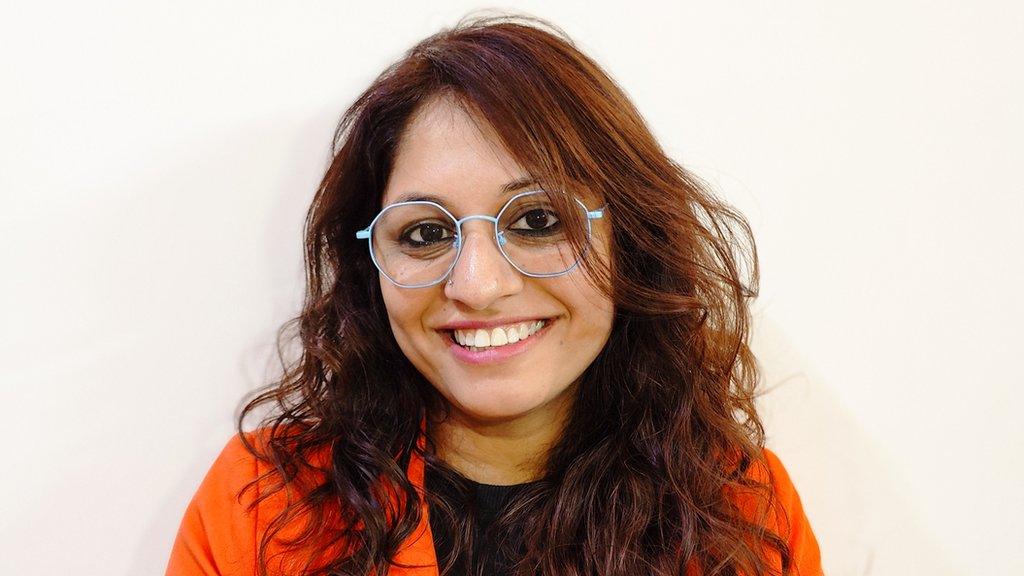New tax divides India's booming computer games sector
- Published

Charanjot Singh, closest to the camera, plays football computer games for India
Charanjot Singh plays football professionally, only he doesn't wear a pair of boots and run around on a pitch.
The 20-year-old instead earns a living playing football computer games, including the tournaments organised by the electronic sports (esports) division of football world governing body Fifa.
Back in June, Mr Singh represented India in Fifa Esports' Nations Cup 2023. This was held in Saudi Arabia, and Mr Singh says he came 64th. According to one report, this earned him $10,000 (£8,000)., external
"I have no idea if I'm good or not, I just enjoy playing," he says.
Mr Singh, who is from the city of Chandigarh, in northern India, is indicative of a country that increasingly really likes computer games.

The vast majority of Indian gamers use their mobile phones rather than a computer
Last year, there were 421 million people in India who played online games, according to a report in April, external by accountancy group Ernst & Young. This was up from 300 million in 2019, and the number is expected to rise to 442 million this year.
The study also said that the combined revenues of online games in India were 135bn Indian rupees ($1.6bn; £1.30bn) in 2022, 22% higher than in 2021. And it predicted that annual growth will continue around this level.
At the same time, a separate report said that the number of Indians participating in organised esports competitions had soared from 150,000 in 2021, to 600,000 in 2022., external
This big growth is said to have been fuelled by the coronavirus lockdowns giving people more leisure time, and the increased availability of affordable smartphones and cheap internet data packs - 90% of Indian gamers use their phones rather than a computer or games console.
While only an estimated 20% of online games played in India are currently made by Indian gaming firms, the homegrown sector has been growing quickly in recent years. And there are now more than 900 Indian gaming start-ups.
Yet while all had been looking good, shockwaves were sent through the industry back in July when the government announced that it was inducing a new 28% tax on online gaming. Such was the vagueness of the wording that the fear was that it could affect all Indian gaming firms.
However, New Delhi subsequently clarified that the tax, which starts next month, will only apply to so-called "iGaming". These are gambling sites, such as online casinos; or "real money" games in which the players have to pay to enter, and then compete to win prize money, such as some fantasy cricket competitions.
The tax does not apply to esports competitions, which are classified as a genuine sport. And while such competitions offer prize funds, you do not have to pay to take part. The prize money instead is covered by sponsorship and people paying to watch the games.
Nor does the new tax affect casual gaming, such as games in which the user may have to pay to participate, or then make in-app purchases to be able to continue. This is because these games do not offer any prize funds.

Only 20% of games played in India are currently made by Indian firms
"This GST is neither applicable nor will it have any impact on the video gaming industry or the esports industry," says Lokesh Suji, director of the Esports Federation of India.
"Esports has been officially recognized as a sport by the government, which finally distinguishes it from iGaming. It will be taxed in the way that it has always been."
Mr Suji adds: "We think the prospects of esports is very bright, especially in the years ahead where we're expecting more corporate support for our young players. And the primary objective of 400 million Indian video gamers, and three billion gamers worldwide, is purely entertainment, and not financial gains or making money."
As for the firms that are affected by the new tax, in terms of collective revenues, they are currently three times larger than the esports and casual gaming sectors. Revenues for iGaming totalled 104bn Indian rupees, external last year, compared with a combined 31bn rupees for esports and casual gaming.
Deepak Manepalli is chief executive of Open Play, an Indian gaming firm that will be affected by the new tax - his games charge users to play them, in return for offering prize money.


New Tech Economy is a series exploring how technological innovation is set to shape the new emerging economic landscape.

"The change will render many businesses unviable, and potentially lead to players with cash reserves or a healthy, profitable track record, leading the show. Companies will have to rethink the unit economics and business models to ensure that player retention and profitability are still achievable in this new normal."
Meanwhile, some analysts say that haphazard regulation remains a problem, as does the fact that rules can differ across Indian states.
Anusha Ganapathi is a Chennai-based data analyst, whose own passion for gaming began as a teenager. She says that India's homegrown games producers need to make more games that appeal to women and families, rather than more multiplayer, shooting games. Currently women represent 40% of India's gamers.
"Creating a game is an art, like making a movie," she says. Ms Ganapathi, who reviews games for the New Indian Express newspaper, adds: "What the industry really needs now are more nuanced games, with rich storylines that would appeal to everyone."

Mourvi Sharma and her team are developing games that appeal to young children and their parents
That's exactly what Mourvi Sharma is trying to do. She is co-founder of Indian games developer BigFatPhoenix. Out of their 12 employees, eight are women.
The team is currently designing what is says are more thoughtful games for children aged eight to 12. "We create a world with diverse characters, using classic adventure storytelling," says Ms Sharma.
"At every twist and turn in the plot the player must make choices, but there's no right or wrong answer. The outcome often allows children to think about the consequences of their choices."
Kamala Thiagarajan is an independent reporter